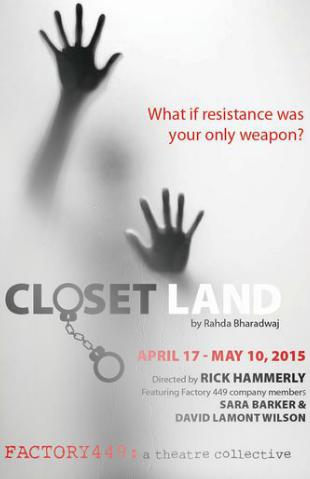If you intend to shut a mind, then it is best to know the mind you are attempting to shut. Going deep into the minds of Factory449 company members Sara Barker and David Lamont Wilson, TheatreBloom interviews these two actors about their experience with Closet Land, the company’s current production that delves into the realm of psychological, emotional, and physical torture in the name of government stability.
Thank you both for this interview. If you could start by giving us a quick introduction, tell us who you are and what your involvement with the show is, and what of your work readers might recognize from around Washington DC in the last year or so.

Sara Barker: I’m Sara Barker and I play the woman in Closet Land. I’m a member of three companies in DC: Factory449, which I’m a founding member of, and the other two are WSC Avant Bard and Rorschach. They’re all great companies to be a part of. Right before this show I was Desdemona in Othello with WSC Avant Bard and before that there wasn’t too much because I’ve recently had a baby. Actually, she’s two now, so maybe not that recent but I really slowed down in the theatre after having my daughter. The really significant thing before Othello was Orlando, which is an adaptation of the Virginia Woolf novel and I played the title character and it was a wonderful project. It was a really well received project by audiences and critics alike, and that was with WSC Avant Bard.
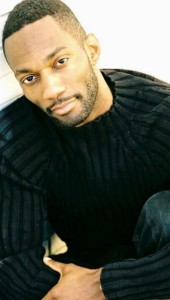
David Lamont Wilson: So I play the man in this piece and like Sara I’m also a company member of Factory449. The last few things I’ve done, I did a brand new piece at the Atlas Performing Arts Center called Not Enuf Lifetimes by Caleen Sinette Jennings, and before that I did The Hampton Years at Theater J. Just before this show I had the greatest honor of being able to sound design a brand new piece at the Alliance Theatre in Atlanta. That was life changing for me as a sound designer. It’s been a busy year.
You mentioned you were both company members of Factory449. How did the interest for being involved with Closet Land come about? Were you familiar at all with the movie?
Sara: This was all Rick’s idea, as a lot of what happens at 449 is. The master of ideas, Rick Hammerly. He loves true crime stuff. He loves Criminal Minds and horror movies and he’s crazy about stuff like that. So he knew about the film and he knew that it had been adapted into a play. He’s where it came from originally. He contacted both of us. Rick is a really good Artistic Director in that way. He actually looks for stuff that he thinks his company members would find challenging or grow through. That’s Mr. Hammerly for you.
What are some of the challenges that doing a very edgy, very dark, and politically charged; two-person, in-the-round, no-intermission, high-intensity show bring about for you both as performers?
David: For me, the biggest challenge is that I have never done anything remotely close to this character in my entire career. That was the biggest one for me; the things that I’m used to doing, all the tricks and skills I’ve developed over the years, I really couldn’t bring most of those to bear. It was scary, very scary. The second biggest challenge for me is, quite frankly because I adore her so much, the safety of Sara. It’s a physically grueling show and you constantly have to be aware so that your emotions don’t spill out so much that I don’t harm my fellow actor. Those are my two biggest challenges.
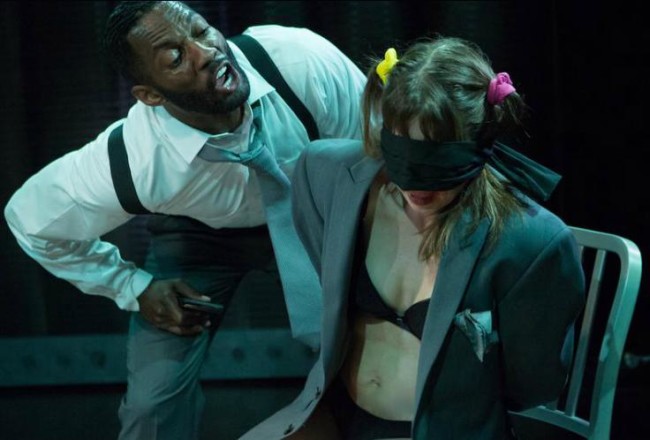
Sara: Casey Kaleba is responsible for a lot of that.
David: To be quite blunt, even though we did have a really good fight choreographer, a lot of the nuances to that choreography are due to Sara. It’s mostly her getting the brunt of the fight. She has some pretty innovative ways of keeping herself safe while making it look harrowing. I should mention because I meant to say it when you asked us about how we got involved with the show, that other than the huge challenge of taking on a role that was so different for me, a big factor of getting involved with this was getting work with Sara again.
Sara: We had worked together once before during 4.48 Psychosis.
David: I also took this on because I’d never worked with Rick before, and I had heard a lot of great things.
Sara: I’ve got to say, we didn’t know for a little while who was going to be playing The Man. And when Rick had mentioned David, I said “Oh, yes! Please!” This is not a show you want to do with a fellow actor that you don’t fully trust and fully feel in tune with. It’s a show that requires a tremendous amount of trust and openness with your director and with your fellow actor. So it was really such a gift that David got cast. There is such a comfort level there. Half of our rehearsals was just us busting out laughing, it’s such a dark show so we really had to find a way to have a good time with it.
Now have you guys worked in the round like this before? And how do you think that impacts the work?
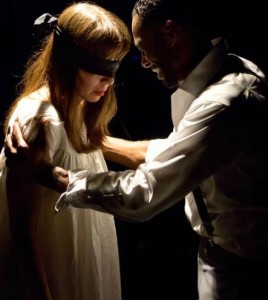
Sara: I’ve done in the round before, but not this tight. And actually that feeds into the big challenge that I’ve had. And Rick really helped me with that. When you’re this close to an audience you really have to be a little bit more of a film actor than a theatre actor. I haven’t done much film at all, just here and there bits and pieces, most of my career has been theatre. So it’s really a different skill set. You can oversimplify it by saying that you’re smaller or your emotions aren’t as big, but I’ve had to think more about my breathing and keeping it simple. Even my eye motions, I have to let them do the acting more than big physical gestures or the big faces that I’m prone to making. My face tends to go everywhere when I act. So to reign that in is really a wonderful challenge. Talk about naturalism…I really struggled to get there and simply. That was Rick’s direction to me for a lot of the process.
David: But on the flip side of that, and I’m sure Sara feels this way too, having the audience that close to you also means you can feel their energy that much more. That’s a bonus.
Have you noticed the audience reaction or the reception while you’re onstage? Does their energy for this piece feel different to what you’re used to feeling from an audience?
David: At least for me, usually when you’re performing all you can do is feel an audience. You can’t see an audience really, they’re there but you can’t see them. But I notice because you guys are a part of the show. You’re literally a victim in the show. I see every movement, I really do, of everybody in the audience. It effects me that way.
Sara: Last night there was a guy and I think maybe he was just doing this because he was afraid of his legs entering the playing space, but he was shifting in his chair a lot. For whatever reason, the way I interpreted that during the show was “Oh my God, he’s really not comfortable here.” So in a weird way I felt like I had an ally right there.
David: Me as well on the flip side, when I feel somebody recoil or I feel somebody being uncomfortable, that I’ve met my objective with Sara. Okay, when they recoil I can go further.
How are you bringing yourselves into these characters to either make these characters more familiar to you or to make yourself more familiar to the character? How are you guys similar, where are your differences, and what techniques, ideas, and inspirations are you using to ground these characters?
Sara: Do you want to go first, Dave?
David: No, you start while I try to fall over an answer. That was a lot of questions.
Sara: Okay. I almost feel like I have the easier challenge here because anyone can end up a victim. It’s possible; there are bad elements out there, whether they are officials or criminals who can do this to a person. I honestly didn’t feel like I had to keep her from becoming a caricature or stereotype of a victim, I just had to put her into the given circumstance as they say. It’s funny because this happened to me a little bit in Othello as well. I had the reaction of “What? Why isn’t she fighting back more?” Personally, I definitely have a strong survivor instinct. So there were points where I was asking Rick, “What’s wrong with her? Why can’t I fight back?” And we had to talk through it. He would tell me, “She’s in shock right now. She’s a well known children’s book writer, she’s a known person and the whole shock of something like this happening to her just throws her so much that it paralyzes her for the first part of the show.” The wonderful thing about Rick as a director is he is very, very exacting, and very, very specific, down to the word. If anything you say or that you do is not really tethered to a sense of truth about the character he will let you know. A lot of credit goes to him for really, really working with us in developing these characters.
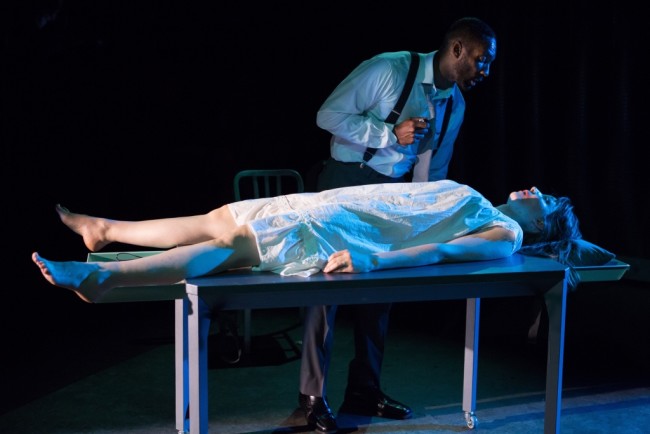
David: I wish I had a better answer, or at least one as good as Sara’s, but I think my answer kind of goes back to my first challenge which is not feeling like I had a whole bunch to draw from either from myself or with other characters that I have played. What was frustrating about it the most for me was that I had to rely so much on Rick’s direction. Thank goodness, like Sara says, he is so specific and down to the word. I grabbed that as much as I possibly could because sometimes outside of the training that you bring to bear and trying to find empathy in this character, I felt like I didn’t have a whole bunch of me to pull from to bring to it. Sometimes I feel like I’m too big, sometimes I feel like I’m too small and I can’t quite gauge the character but Rick is the glue that is my base for this character.
This show moves fairly quickly, but is there a moment in the show that really defines the show for you and your character?
David: Hmm. That’s a really good question.
Sara: For me it’s right after The Man pulls his little trickeroo in giving me the apology letter, and he says “oh no, I never said it was being typed.” And it’s right after that where I decide I’m getting the hell out of there, but then I realize all the doors are locked and there is no way I can get out. I come back thinking “okay, I’m going to get him to open up that door.” But all then all the sudden he lays into me with this insane speech about us being seekers of truth. At that point, you know I had some inklings before that I was dealing with a crazy person, but now I really have to be careful and figure out a way to get out of here because this man is not sane.
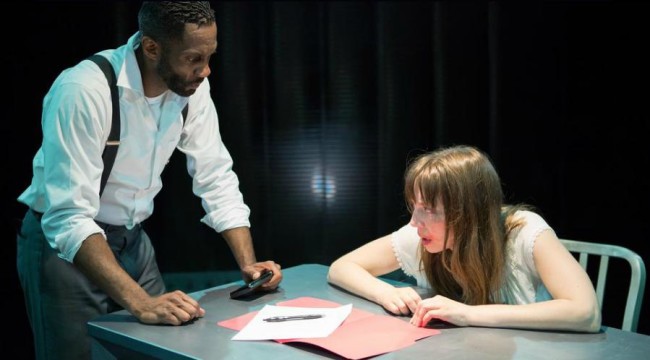
David: I think for me it comes the moment Sara starts explaining her children’s story. We go into this back and forth of ideas, really. It becomes a chess match. She begins to challenge me. That’s when it in a sick way becomes really fun for me.
What is it that you are imagining that people are taking away from seeing this?
David: I will mention one thing because I think this is the one thing that everybody walks away with whether they completely understand the piece, or whether they have enjoyed the piece in some way; they definitely experience a different theatre experience, or at least one that they don’t get exposed to very often. You’re not observing the show, you’re being a part of the show. I’m hoping that’s the one big thing that they realize is special about this piece.
Sara: I actually see this as kind of a heroic story. Even though I think most people are going to feel that she’s done for by the end. Her mind is never broken. Her will is never stomped out. Even though she’s probably headed for a lobotomy or something like that. Now I don’t know for sure because I haven’t talked to many people after they’ve seen it, but my hope is that they see this very dark show and realize “hey, she never broke.” As the reveal comes in the end of her being a victim of child abuse, I think that’s what really drew me into the story, that twist at the end. This disassociation that she’s been able to do has saved her life he entire life. That’s probably more of a personal takeaway than what the audience may be taking away?
David: I love that Sara says her mind isn’t broken at the end of the show. It just reminded me, and I haven’t told you this yet, Sara, but last week when we were on break, I had this dream and you were in it. You and Nelson Mandela, he was in this dream also. After I had woken up and forgotten about the dream, you just reminded me about it. Nelson Mandela was in Robben Island for 27 years. We didn’t know that he was going to come out. But he came out, I believe, because his spirit and his mind was not broken while he was in there. And you saying that made me think about that, and I wanted to put that out there.
What do you think it takes to break a mind, or do you believe that a mind can be broken?
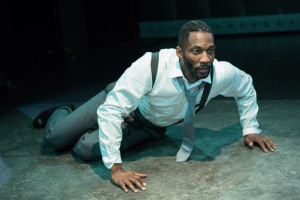
David: Oh my. There are so many ways to attack that question. Yes, I think a mind can be broken. I think we see it with governments every single day. Or we can read about those minds being broken in governments with their torture techniques. The biggest example that I can think of that I just mentioned is Mr. Mandela, and that was a clear example of the human spirit and the mind not being broken, but yes it can be broken.
Sara: I totally agree with David. The mind can totally be broken. Holding onto something like a value system or a belief system or in her case a wonderful fantasy world, that can get you through a tremendous amount. Now, I’m not a torture expert, so I don’t know how far you can go with that. But I think one of the messages of this play is that if you put your mind to it, it can be a survival method. Latching yourself onto something in the way she does, you can get through lots of things. Any hero, any martyr, any heroic person, that can be true for them. If they’re doing things for a reason and that reason is in their head that can keep them from breaking. You hear stories of mothers lifting cars off their children and it’s very powerful— what you put in your head and what you live by every day can keep you strong and make you heroic. I think that’s a really great instructive lesson because a lot of people live day to day and don’t really think about that sort of thing.
I think it goes hand in hand with the other message of the play where if we’re not careful we’ll shut our eyes to the really horrible things that are going on all around us. It’s another mind trick— well not so much a trick, but it’s getting comfortable with having an unexamined life, we train ourselves not to see the horrible that is happening all around us to innocent people.
What has taking on this show that is heavily steeped in psychological repercussions taught you about yourself as a performer, and even a step further, what has it taught you about yourself as a human being?
David: Well the obvious for me is that, and I said this often when we first started rehearsals, but I didn’t know if I could do this as an actor. If it would be believable or if I could succeed with making it believable. I feel at the end of the night every night somehow I have pulled it off. That is the big thing. I feel like I learned how to do it. Personally, it could be the sado-masochist element and the way I’ve interpreted the character. This isn’t necessarily in the script, but he’s a child molester and knowing that just gives me more and more empathy for people who have experienced that.
Sara: David has to climb into a pretty sick mind every night.
David: It’s unsettling. But I believe he’s been brainwashed into believing that what he is doing is just doing his job.
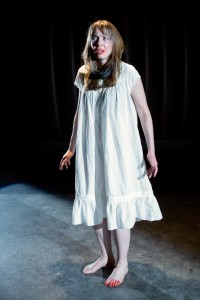
Sara: As a performer, going back to what I said earlier about my personal acting technique challenges of pulling back some and not letting everything rage out of control with my facial expressions, being that close has taught me that with a really good actor you can almost read their thoughts. That is a fun challenge to get to that level with this with that type of acting. On an actor level that’s been really challenging but really rewarding. On a personal level, the first show I did with Factory449, which David was also a part of, was 4.48 Psychosis, which is basically a beautiful suicide poem. People would ask me afterward, doesn’t it really affect me? But we all have that darkness within us, so going there for that hour or however long the show was, there was just something really nice about it. With this show, the writing isn’t as poetic and maybe that’s part of it, but it takes a good deal longer for me to get out of it at the end. It might be partly the physicality because the show is so physical and brutal for these characters. The intensity of that kind of experience, basically she wakes up to the fact that she was abused as a child, it was a repressed memory and it comes out.
I don’t think I’ve ever played a more emotionally charged scene where all the memories of her abuse come flooding into her mind. From that point in the play on I’m a wreck. So it really takes effort to shake it off after the show. It’s a workout! More than any other show than I’ve ever done, I mean it feels good, like a good workout, but it’s intense. I like the character. She is a survivor. I enjoy playing her. The power of imagination is something I’ve always been fascinated by, it’s one of the reasons I do theatre. It’s hugely inspirational, so playing a character whose power of imagination gets her through her toenails being pulled off is just really exciting for me. And it’s life affirming in the end, or maybe human spirit affirming.
Closet Land plays through May 10, 2015 at Factory 449: A Theatre Collective at the Anacostia Arts Center— 1231 Good Hope Road SE in Washington, DC. Tickets are available for purchase at the door or in advance online
Click here to read the review of Closet Land.

